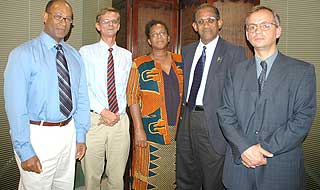|
Damage Assessment Workshop
Led by experienced ECLAC and UNDP facilitators, the workshop presented ECLAC's methodology for assessing damage caused by natural disasters. Practical exercises also showed participants the importance of carrying out proper and timely damage assessments. Conducted in association with the UNDP and ECLAC, this workshop was part of a range of Government's post-Ivan activities, all aimed at reducing risks associated with natural disasters. Mr. Esteban Perez from the UNDP led 12 participants on an assignment to demonstrate the importance of correctly and speedily completing damage evaluations. The ECLAC methodology for creating these assessments was used post-Ivan in preparing the ECLAC/UNDP report, The Impact of Hurricane Ivan in the Cayman Islands, released last December. Mr. Perez provided an example of a mock disaster, grouping participants into sectors for social concerns, infrastructure (manufacturing and commercial) and economics/tourism. Each group was tasked to summarize the overall effects of 'disaster' damage on the economy. Deputy Permanent Secretary for the Ministry of Health Services Diane Montoya was part of a group analyzing the social sector: "Our sector included housing, education and health which all have a direct impact on the human population," Ms. Montoya said. "We've had to look at the number of people in shelters, the costs of feeding the entire population, and making repairs to homes, schools and hospitals. We've seen how important it is to gather accurate data and to work cooperatively with the other sectors to arrive at a realistic report in a short time frame." Chairman of the Essential Relief Services for the NHC, Ms Deanna Look Loy, who experienced firsthand the coordinating of emergency shelters during Hurricane Ivan, commented that during Hurricane Ivan there were nearly 4,000 residents in the formal shelters but over 2,000 more stayed in informal ones, in churches and office buildings. "If we didn't count them, we would not get the true picture of the extent of disaster," Ms. Look Loy said.
Social Affairs Officer for the United Nations, Ms Asha Kambon, whose workshop presentation focused on how human populations are affected by disasters, stressed the importance of investigators in all sectors collecting data accurately, however difficult the challenge: "Information for ECLAC's report on Hurricane Ivan was analyzed during a one-week period where we often had to work overnight in order to produce the report on 21 December," she said. Ms Look Loy added that local knowledge learnt from Hurricane Ivan will be invaluae of the presenters, Mr. Franklin McDonald from the UNDP, raised the point that we shouldn't ignore cultural knowledge and information that is passed down from the older generation, such as building methods and materials which can resist tropical storms. Vernacular building methods such as placing homes on stilts and designing them with small, strong rooms have been passed down the generations and we can also learn from that history."
| ||||||||||||||||||||||||||||||||||||||||||||


 A three-day training seminar, Vulnerability to Natural Disasters and Damage Assessment, took place 19-21 April. It was hosted by the Cayman Islands Government (CIG) and conducted jointly by the United Nations Development Programme (UNDP) and the Economic Commission for Latin America and the Caribbean (ECLAC). Forty officials participated from Government, the National Hurricane Committee and local agencies actively involved in disaster management and planning.
A three-day training seminar, Vulnerability to Natural Disasters and Damage Assessment, took place 19-21 April. It was hosted by the Cayman Islands Government (CIG) and conducted jointly by the United Nations Development Programme (UNDP) and the Economic Commission for Latin America and the Caribbean (ECLAC). Forty officials participated from Government, the National Hurricane Committee and local agencies actively involved in disaster management and planning.  Ms. Montoya added "We all now have an understanding of how all sectors are connected. For example, in our exercise, the Infrastructure sector informed us that the water supply was damaged and that directly affected the human population since we then assumed the water was contaminated. In turn that led to local water being shut off and water being shipped in. It's clear that besides the cost to rebuild the infrastructure, we must also look at the human costs and impacts. Understanding the impact of a disaster such as Hurricane Ivan has already led to policy decisions and changes being made by Government."
Ms. Montoya added "We all now have an understanding of how all sectors are connected. For example, in our exercise, the Infrastructure sector informed us that the water supply was damaged and that directly affected the human population since we then assumed the water was contaminated. In turn that led to local water being shut off and water being shipped in. It's clear that besides the cost to rebuild the infrastructure, we must also look at the human costs and impacts. Understanding the impact of a disaster such as Hurricane Ivan has already led to policy decisions and changes being made by Government."